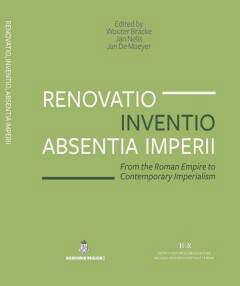
- Retrait gratuit dans votre magasin Club
- 7.000.000 titres dans notre catalogue
- Payer en toute sécurité
- Toujours un magasin près de chez vous
- Retrait gratuit dans votre magasin Club
- 7.000.0000 titres dans notre catalogue
- Payer en toute sécurité
- Toujours un magasin près de chez vous
Renovatio, Inventio, Absentia Imperii
From the Roman Empire to Contemporary Imperialism
Wouter Bracke
39,22 €
+ 78 points
Description
The present book is the result of the conference 'Renovatio, inventio, absentia imperii. From the Roman Empire to Contemporary Imperialism', held in Brussels at the occasion of the 75th anniversary of the Academia Belgica in Rome (September 11-13, 2014). At the heart of the conference was the 'reception', 'Nachleben' or 'permanence' of the Roman Empire, of an idea and a historical paradigm which since classical Antiquity has supported the most widespread claims to obtain and consolidate power. The volume's focus is on culture in a broad sense, i.e. including besides the arts, philosophy, religion and, most importantly, discourse. As such, a wide array of themes are subjected to academic scrutiny. Whereas the main focus is on Europe and North America, some contributors also reach out towards non-Western contexts, whether or not directly related to the Roman example. A theoretical and sociological dimension is also added thanks to the discussion on methodological issues. More specifically, the following question(s) receive particular attention: what is our position as researchers, embedded in a contemporary, often Western, democratic and capitalist context; what about the notion of empire itself, its constituent elements and the kind of ideological prerogatives to which it is generally subjected; in other words, apart from the many historical variants and instances of reception of empire, through which filters can, and inevitably do, we approach this topic? A question that has become ever more pregnant since the beginning of the twenty-first century, after the dissolution of the Soviet Union, the events of September 11, which have revivified what could be called American 'imperialism', and at a time when an essentially economic variant, driven by 'emerging' powers such as China, has increasingly contested existing power structures. In light of such meta-historical awareness, this book touches as much on the nature of the Roman Empire as it does on its historical legacy and, more importantly so, on who claims the latter inheritance throughout the most diverse epochs. By discussing some highly contrasting views upon this topic, participants explore issues that are of fundamental importance to the writing, not only of cultural history, but also of history itself.
Spécifications
Parties prenantes
- Auteur(s) :
- Editeur:
Contenu
- Nombre de pages :
- 337
- Langue:
- Anglais
- Collection :
Caractéristiques
- EAN:
- 9789074461924
- Date de parution :
- 10-12-18
- Format:
- Livre broché
- Format numérique:
- Trade paperback (VS)
- Dimensions :
- 157 mm x 239 mm
- Poids :
- 612 g

Les avis
Nous publions uniquement les avis qui respectent les conditions requises. Consultez nos conditions pour les avis.






